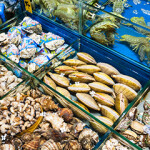EU fish processors pushing to retain ATQ regulations to continue Russian seafood imports

Trade organizations in the E.U. are pushing for the bloc to continue allowing Russian-caught fish into the region as negotiations on autonomous tariff quota (ATQ) regulations for 2024 and 2025 continue to roll along.
Europe’s ATQ regulations allow a certain quantity of a product to enter the E.U. at a reduced or suspended tariff rate for select fishery products.. In relation to the ATQ talks, the E.U. Fish Processors and Traders Association and the European Federation of National Organizations of Importers and Exporters of Fish – collectively known as the AIPCE-CEP – have written to both the European Commission and the European Council to press for continued access to Russian-caught fish.
The AIPCE-CEP’s letter states that E.U. supplies of certain fishery products currently depend on imports from third countries, and the ATQ system continues to be the primary trade instrument for securing those supplies for many E.U. companies. Moreover, it raises concerns over the Commission’s proposal to narrow the scope of species and products that qualify, namely to the detriment of fisheries products coming from Russia.
The letter, jointly written by AIPCE President Guus Pastoor and CEP President Yobana Bermudez on 10 October, states the association fully acknowledges “the complex political context” surrounding the ongoing negotiations on the next cycle of the regulation, “especially in light of Russian aggression in Ukraine.”
Even though some calls for ATQ reform revolve around leveling the playing field for European producers, the letter also stressed the E.U. market’s high dependency on imports of Russian fish – both as a raw material for direct processing in the E.U. and as a supply source for intermediate processing in other third countries, such as China, prior to value-added operations conducted by member states.
“It is worth noting that the Commission made a deliberate decision to exclude basic food products from the initial sanctions for various reasons,” they wrote, drawing a comparison to the necessity of Russian-origin seafood. “This decision was motivated by food security concerns and the impact that sanctions would have on inflation rates, cost of food products for end consumers – especially for households with lower incomes – and the overall cost of living.”
The pair also pointed out that the council previously recognized the “substantial dependency” of several industrial sectors on raw materials originating from Russia and that some of these products have consequently escaped ...
Photo courtesy of the Global Shrimp Forum





Share